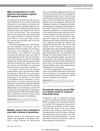 2 citations,
April 2021 in “International Journal of Pharmaceutics”
2 citations,
April 2021 in “International Journal of Pharmaceutics” Serum formulations were better at delivering molecules to the hair bulb than nanoparticles.
 April 2023 in “Journal of Investigative Dermatology”
April 2023 in “Journal of Investigative Dermatology” Cinchona succirubra extract with caffeine improves hair growth and reduces hair loss.
 30 citations,
December 2011 in “Journal of biological chemistry/The Journal of biological chemistry”
30 citations,
December 2011 in “Journal of biological chemistry/The Journal of biological chemistry” Keratin 17 is modified by RSK1 in response to growth and stress, affecting skin growth and stress response.
 August 2013 in “Fertility and Sterility”
August 2013 in “Fertility and Sterility” PCOS may be influenced by factors in the blood, not just the ovaries.
 4 citations,
March 2018 in “Journal of labelled compounds & radiopharmaceuticals”
4 citations,
March 2018 in “Journal of labelled compounds & radiopharmaceuticals” A new compound was effective for imaging prostate cancer in rats.
 October 2018 in “International journal of clinical & experimental dermatology”
October 2018 in “International journal of clinical & experimental dermatology” Baicapil was effective in reducing hair loss and increasing hair growth in women with telogen effluvium.
 February 2024 in “Journal of Pakistan Medical Association”
February 2024 in “Journal of Pakistan Medical Association” Low zinc levels in hair and serum are linked to chronic hair loss.
 February 2019 in “Trace elements and electrolytes”
February 2019 in “Trace elements and electrolytes” Women with chronic hair loss had lower levels of zinc, copper, and ferritin than healthy women.
 October 2021 in “QJM: An International Journal of Medicine”
October 2021 in “QJM: An International Journal of Medicine” People with severe hair loss have higher levels of a protein called interleukin 17 in their blood.
 53 citations,
October 1993 in “Drug Safety”
53 citations,
October 1993 in “Drug Safety” Oral retinoids can cause side effects ranging from mild to severe, including birth defects, and require careful monitoring and contraception.
September 2019 in “Human Andrology” Higher serum androgens contribute to male pattern baldness.
May 2023 in “Journal of Cosmetic Dermatology” Androgenetic alopecia is linked to higher cardiovascular and metabolic risks, possibly due to irisin resistance.
 77 citations,
November 2007 in “International Journal of Andrology”
77 citations,
November 2007 in “International Journal of Andrology” Testosterone with or without finasteride doesn't improve thinking skills in older men with low testosterone.
January 2022 in “Journal of Cosmetics, Dermatological Sciences and Applications” The serum increased hair density and was well-tolerated, but didn't affect hair thickness or shedding.
 July 2003 in “Journal of Cutaneous Medicine and Surgery”
July 2003 in “Journal of Cutaneous Medicine and Surgery” Various skin conditions like cutaneous lupus erythematosus, psoriasis, and basal cell carcinoma can be effectively treated with antihypertensive agents, NB-UVB phototherapy, and imiquimod cream respectively. Vaccines are effective against genital herpes and HPV-16 infection. Early intervention is crucial for conditions like diabetic foot ulcers and neonatal herpes. Certain dyes can cause hand dermatitis, and there's a link between smoking/drinking and psoriasis in men. No direct link was found between low iron levels and chronic hair loss in women.
 8 citations,
January 1986 in “Journal of hepatology”
8 citations,
January 1986 in “Journal of hepatology” Men with liver cancer have higher levels of a specific testosterone byproduct in their liver and blood, despite overall lower male hormone levels.
February 2020 in “Benha Journal of Applied Sciences” Higher Galectin-3 levels are linked to insulin resistance and may predict androgenetic alopecia severity.
 19 citations,
January 2015 in “Journal of Clinical and Diagnostic Research”
19 citations,
January 2015 in “Journal of Clinical and Diagnostic Research” The main causes of diffuse hair loss in women are telogen effluvium and androgenetic alopecia, often related to stress and iron deficiency.
1 citations,
January 2020 in “International Journal of Trichology” High YKL-40 levels predict early hair loss and hidden metabolic issues.
 June 2023 in “Benha Journal of Applied Sciences”
June 2023 in “Benha Journal of Applied Sciences” People with chronic hair shedding have lower antioxidant levels in their blood compared to healthy individuals.
 30 citations,
August 1992 in “The Journal of Clinical Endocrinology and Metabolism”
30 citations,
August 1992 in “The Journal of Clinical Endocrinology and Metabolism” Finasteride doesn't affect hormone levels in normal men.
 April 2007 in “Nature Clinical Practice Urology”
April 2007 in “Nature Clinical Practice Urology” Finasteride lowers PSA levels about the same whether taken at 1 mg or 5 mg daily.
 67 citations,
November 2002 in “Journal of The American Academy of Dermatology”
67 citations,
November 2002 in “Journal of The American Academy of Dermatology” The document concludes that careful evaluation is key to diagnose and treat women with hair loss, with tests for thyroid, iron, and hormones as needed.
July 2020 in “Endocrine practice” A 13-year-old boy with Cushing syndrome has high cortisol levels from a pituitary gland issue and underdeveloped sexual characteristics.
 20 citations,
October 2017 in “Clinical Endocrinology”
20 citations,
October 2017 in “Clinical Endocrinology” The conclusion is that removing both ovaries is the best treatment for excess male hormones in postmenopausal women, with medication as another option, and managing insulin resistance is important for diagnosis and treatment.
 1 citations,
January 2002 in “Journal of Clinical Dermatology”
1 citations,
January 2002 in “Journal of Clinical Dermatology” Low iron levels in the blood may be linked to chronic hair loss in women.
14 citations,
January 2013 in “Journal of the Egyptian Women's Dermatologic Society /Journal of the Egyptian Women's Dermatologic Society”  39 citations,
September 2017 in “The Open Rheumatology Journal”
39 citations,
September 2017 in “The Open Rheumatology Journal” Low serum complement levels in SLE patients don't always match with disease flares; monitoring C3 and C4 is useful, but cell-bound complement products might better indicate disease activity.
 36 citations,
November 2009 in “Journal of Investigative Dermatology”
36 citations,
November 2009 in “Journal of Investigative Dermatology” Prolactin may affect hair growth differently based on gender and scalp area.
 10 citations,
February 2007 in “Clinical techniques in small animal practice”
10 citations,
February 2007 in “Clinical techniques in small animal practice” Dogs with sex hormone imbalances may not drink or pee a lot but often lose hair on their body and can have reproductive system issues.






















